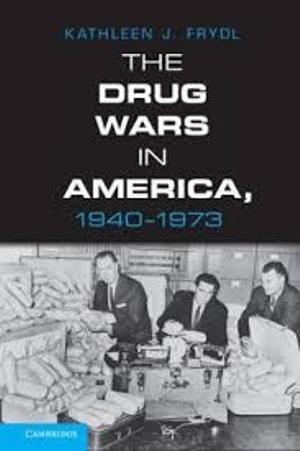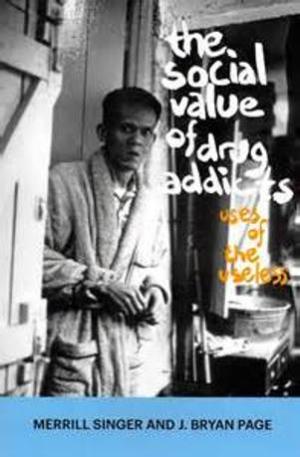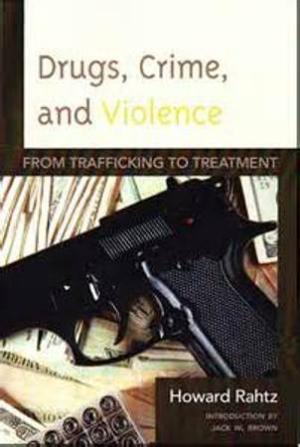Drugs, Crime, and Violence: From Trafficking to Treatment by Howard Rahtz (2013, Hamilton Press, 141 pp., $28.99 PB)
The Drug Wars in America, 1940-1973 by Kathleen Frydl (2013, Cambridge University Press, 447 pp, $34.99 PB)
The Social Value of Addicts: Uses of the Useless by Merrill Singer and J. Bryan Page( 2014, Left Coast Press, 248 pp., $29.95 PB)

The prison population is dropping, and so is the number of drug war prisoners. Federal drug war prisoners are now going to be doing less time thanks to reforms passed during this administration, and maybe even less time, if the US Sentencing Commission has its way. State drug war prison populations are shrinking, albeit too slowly.
Marijuana reform is moving fast, with widespread state-level approval of medical marijuana and decriminalization laws, and now, outright legalization in two states, with more to come in short order.
Some state-level legislators still have the urge to respond to "drug menaces" with ever-tougher criminal justice responses, but those impulses don't usually get the traction they used to, and they are being countered by an increasing acceptance of public health and harm reduction approaches at the statehouse.
And even internationally, where not so long ago, prohibitionist orthodoxy was the consensus position, drug warriors can no longer count on a united front. Uruguay has led the way on marijuana legalization, and the number of countries that have serious issues with the drug war status quo is growing. Perhaps the day when we look back on drug prohibition as a bizarre and embarrassing episode in our national history is coming sooner than we dare to think.
The three books under consideration here address different facets of our drug policy; one tells us how we got here, one explains (at least in part) why we're stuck here, and one offers up suggestions on where we go from here. With apologies to Dickens, it's as if we're seeing the ghosts of drug war past, present, and future.
In The Drug Wars in America, award-winning historian Kathleen Frydl excavates the prehistory of the drug war, focusing on the era between the beginning of World War II and the commencement of the modern drug war under Richard Nixon in the early 1970s. In doing so, she makes the argument that the growth of the anti-drug bureaucracies during and in the immediate aftermath of World War II was driven not so much by the desire to control drug use as by the need of the federal government to reshape itself in an era of rapidly-expanding state power.

Frydl isn't about race or culture when it comes to explaining the deep roots of drug prohibition, but about the politics of state power. Her analysis brings a bracing bit of hard-edged political science to the whole question. And of course, while she doesn't emphasize racial or cultural factors, but rather the imperatives of building the Imperial State, she acknowledges the role of race especially in creating an Other against whom it is easy to take action.
And that leads us to the analysis of social scientists Merrill Singer and J. Bryan Page in The Social Value of Drug Addicts. Singer and Page are all about "othering," the process of labeling out-groups as deviant, dangerous, and deserving of repressive actions against them. Drug users have most definitely been "othered" as worthless slackers and disease-bearing burdens on society, although as the authors note in a fascinating historical analysis, this phenomenon of defining drug users as "deviant" is a relatively recent historical innovation, tied as much to the changing role (and class nature) of drug use as to the biopharmacological effects of the drugs themselves.
"Othering" is not a discrete event rooted in a place and time, but an ongoing process, one that helps justify actions taken against the Other, in this case, the horrid persecutions of drug users under the rubric of the drug war. Singer and Page take the reader on a journey through literary, pictorial, cinematic, law enforcement, and policymaking "othering" of drug users, showing at the same time how this socially constructed, drug using Other reinforces the very necessity of repressing and punishing it.

"I promise you, regular cocaine users do not look like this. They are scrawny and look unhealthy," voluptuous British celebrity chef Nigella Lawson said, explaining how she was not a regular cocaine user. The lovely, upper class Lawson just "othered" her fellow cocaine users.
The Social Value of Drug Addicts is a valuable contribution to the literature of drugs and drug policy, and it adds an analytical perspective sharply different from Frydl's. There is room for both, and then some, when it comes to understanding the complexities of drugs, drug use, drug users, and drug policy.
Howard Rahtz, author of Drugs, Crime, and Violence, has another perspective, one formed by a unique life's work divided between decades in drug treatment and rehabilitation and decades as a drug interdicting Cincinnati police officer. If Frydl traces the ghosts of the drug war's past, Rahtz is about the ghost of the drug war's future, or, more accurately, a future without a drug war.
"Prohibition has filled our jails, criminalized millions of our citizens, provided a financial windfall for international and local criminal groups, and somehow we never tire of pretending that it's working," he writes.
At this point, critiques of drug prohibition are nothing new, but Rahtz teases out three measures of policy soundness -- effectiveness, cost, and basic fairness -- that scream out for a dramatic policy shift away from prohibition. He also provides policy prescriptions for getting off the drug war expressway and onto the exit ramp, beginning with marijuana legalization (which is also embraced by the authors of the other books reviewed here).
Rahtz also calls for the decriminalization of drug possession, but not full-blown legalization. And his full-throated advocacy of drug courts will leave some reformers cold. But Rahtz's conception of the role of drug courts in an era of drug decriminalization is more akin to the alcohol treatment orders judges sometimes give drunk drivers than it is to the way drug courts currently operate.
With drug use itself not being a crime, it would take some other sort of criminal activity to get a drug user in front of a judge in the first place. As a person who is not fond of drug courts and their coercion, regardless of their efficacy, I could swallow post-decrim drug courts for drug-addled misbehavers much more easily than I can their current incarnation.
For the lay reader, Rahtz's work may be the most accessible, but both Frydl and Singer and Page also offer valuable contributions to our understanding of the huge, complex issues around drugs, drug use, and drug policy. Policymakers would do well to consider what ghosts of drug war past, present and future are saying.
This work by StoptheDrugWar.org is licensed under Creative Commons Attribution-ShareAlike 4.0 International
Comments
Tonight!
Prohibitionists are Traitors
The damage done by prohibition is far worse than the damage caused by all of the illegal drugs combined.
If you support prohibition, then you are guilty of demagoguery, sadomoralism, greed, deception, self-deception, despotism, racism, willful ignorance, fraud, murder, oppression, torture, espionage, corruption, theft, money laundering, illegal arms transfers, militarizing domestic police forces, political intrigue, bigotry, class warfare, hate crimes, human rights crimes, erosion of constitutional rights, invasion of privacy, extortion, environmental pollution, obstruction of justice, corruption of the scientific method, infanticide, genocide, trespassing, bribery, illegal restraint of trade, illegal surveillance, religious intolerance, thuggery…this list may actually be endless.
Everything we have been told by the government about drugs is a lie; the two most dangerous and addictive, gateway drugs are already legal: alcohol and nicotine.
The only thing that has proven to reduce use and demand is legalized regulation combined with treatment and education.
Add new comment